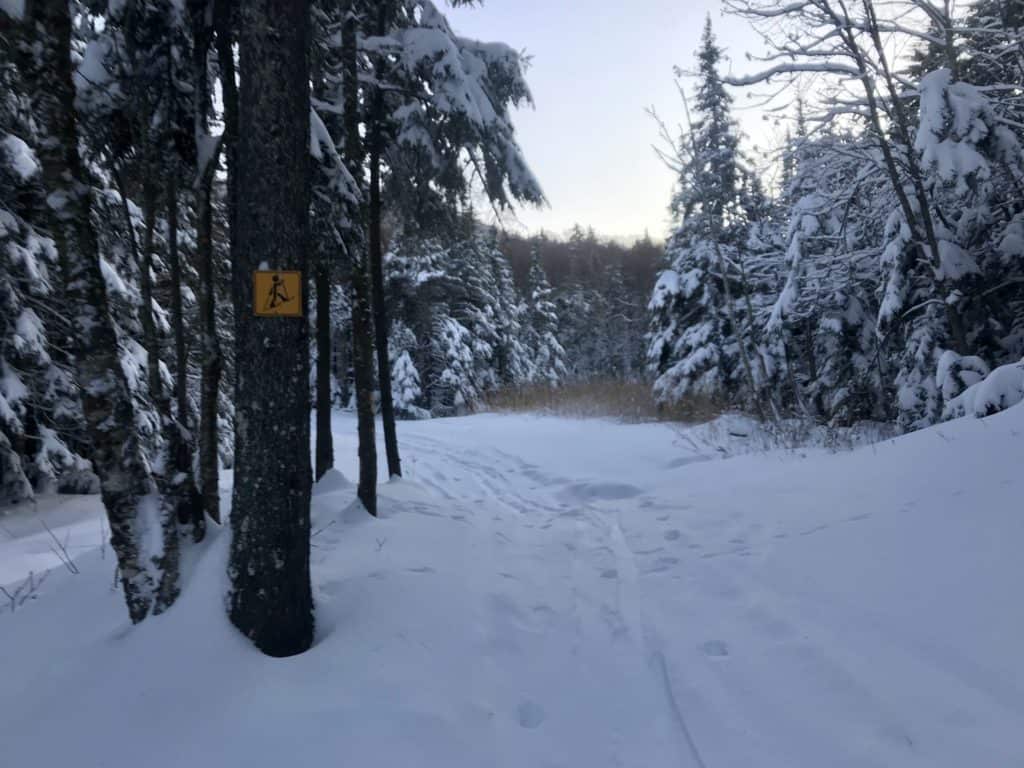
By Merisa Sherman
I keep moving. I can feel my ski slide underneath me as I collapse onto my front leg. With each stride, I move forward, onward and upward through the darkness. I swing my left hip forward, feeling the resistance of my skins as I drag my ski along the snow. Paying close attention, I can feel the different fibers of the skin latching onto the surface at the end of each stride. One foot in front of the other, as I deliberately work toward my goal of the summit.
I pause to catch my breath, desperate for a moment of respite on my arduous journey. And in this moment, I pause to look up in the direction of my travel. The morning light is beginning to dawn and I can barely make out the summit up ahead. She seems so far away and forbearing, making a timely ascent appear almost impossible. I check my watch, anxious that I’ve already been climbing too long without enough progress. And I begin to worry that I won’t make the summit in time.
At this point, I can make a choice. I can choose to turn around and go home, fearful of the hard climb to come and unwilling to trust the unknown. To return to the warmth of my bed and the comfort that I know awaits me. I can choose to turn around here, convincing myself that I am satisfied with a lower peak. Persuading myself that the skiing will be good enough from here, I can choose not to continue my ascent rather than push onward toward the true goal: the mountaintop.
In my short burst of despair, I look down at my skis and remind myself that there is only one way that I will be reaching the top of the mountain on this or any other morning. There is only one way that I can maneuver around this bend in the trail, and through the trees up ahead. There is only one way that I can push through this steep section, one in which I will undoubtedly slip backwards several times. I must learn to trust myself.
I must choose to move forward. I must choose to not give up, but to continue our climb up the mountain. Instead of using poles to desperately hold onto the mountain in fear, I must rock back into my own body and press my heels into the snow. I must place trust in my strength, in my learned skills and in my valued equipment. I must look deeper into my true self, to find the motivation to move up this mountain.
And so I chose to continue on, each slide, each stride, pulling me closer to the top of the mountain. At some points in my climb, I cannot see the summit. It may be blocked by a ridgeline or the fog settling in, but the summit always seems out of reach. So I must have faith that through my repeated determination, I will, one day, reach the mountain top and enjoy all the glory that awaits us on the descent.
What are our mountains, truly? It is easy to imagine the simple task of skinning up Pico, the joy of seeing the sunrise from a mountaintop and the fresh, untouched snow of a dawn patrol that lies awaiting the descent. While these mountains are beautiful and their joy simple, there are other mountains which we must climb, there are other struggles that we must confront. We cannot just climb this mountain. We must, as Dr. Martin Luther King, Jr. reminded us so eloquently, “Keep moving from this mountain.”
In his April 10, 1960 speech at Spelman College, Dr. King addressed a small crowd of female students and reminded them that, like Moses leading his people out of Egypt, they must not turn around or be comfortable with that already achieved. These things must not be enough, but instead we must say that “We will go on in spite of the obstacles, in spite of the difficulty, in spite of the sacrifices that we will have to make.” We must choose to push forward to the highest peak, for only then will we stand on the mountaintop and see the promised land.
For many skiers, MLK weekend means simply an extended weekend with more ski time. But I cannot find a single piece of evidence that Dr. King himself ever went skiing or struggled with the decision of when to turn around on an ascent up Pico. However, Dr. King did speak of four mountains up which he and the citizens of our nation must all ascend before we can be rewarded: the mountains of Moral and Ethical Relativism, of Practical Materialism, of Racial Segregation and of Corroding Hatred and Crippling Violence. Only when we have moved beyond these four mountains of injustice, will we find the freedom and fulfillment which we seek.
As we move toward the next chapter, as we do every four years, we must continue to do better. We must continue to climb up the mountains that challenge us and we must not turn around or rest in our compliance. As Dr. King reminded us in his final sermon on April 3, 1968, only from the mountaintop can we see the promised land. Until then, we must continue to put one foot in front of the other, we must keep moving.




